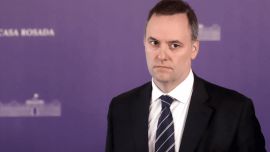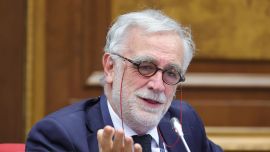It is widely assumed that unless President Alberto Fernández’s government reaches an agreement with the International Monetary Fund very soon, Argentina will sink far deeper into the mire in which she has been trapped for so many decades, with millions more of her inhabitants falling below the poverty line and increasing numbers of businessmen and talented youngsters moving abroad because they are convinced it would be worse than useless for them to stay here. We could be about to learn if the many who think this way have it right or if they are merely scare-mongering.
The signs are ominous. When a couple of days ago Economy Minister Martín Guzmán admitted that negotiations with the IMF were going badly because the Kirchnerite brand of economics is not properly appreciated in other parts of the world, the money markets reacted in their usual fashion by selling off anything connected with Argentina and sending the country risk index even higher that it already was.
Perhaps few genuinely fear that the country is about to become a slightly less tropical version of Venezuela, which under a regime many Kirchnerites admire has been reduced to a wretched wasteland ravaged by famine and swarming with thugs who have driven more people into exile than have the Syrian regime and its equally brutal enemies, but it cannot be denied that the prospects facing Argentina do look decidedly bleak.
All this confronts the Kirchnerite government with an unpleasant dilemma, one which has less to do with the welfare of the country’s inhabitants than with its own political and personal priorities. Its leaders feel they have to choose between coming up with a “plan” which, to pass muster, would presumably have to include measures that would be bound to hurt the millions of their supporters who rely on hand-outs, as well as their friends in the crony capitalist community, and doing their best to make the most of whatever disasters lie in wait by blaming them on their political foes. Many evidently prefer the second alternative.
Guzmán, President Alberto Fernández and their allies want people to believe that, were it not for the dogmatism of the technocrats who surround Kristalina Georgieva, they would find it fairly easy to reach a mutually satisfactory agreement with the institution the Bulgarian lady formally heads. They argue that for the country to repay bit by bit the tens of billions of dollars it owes the IMF, the economy would have to keep growing at a rapid pace, as it has done lately after bouncing back from a nasty Covid-induced slump, which is why in their view the belt-tightening measures neoliberals go on about would be counterproductive.
They are presumably right when they say that if far more money got pumped into the economy, Argentina could quickly extricate herself the swamp into which she wandered many years ago and that would benefit everybody, including Georgieva and her colleagues. Unfortunately, not just for them but for a great many other people, in this part of the world real money is in desperately short supply. Given the political elite’s habit of refusing to honour the country’s debts, and the government’s hostility to producers of exportable goods, the situation is unlikely to change any time soon.
In any event, though representatives of the IMF no doubt agree that it would be wonderful if Argentina somehow managed to get rich enough to pay back all her creditors and afford the generous social programmes her politicians think necessary, they also think that something will really have to be done to rein in inflation, which is currently galloping ahead at over 50 percent a year and looks likely to go even faster in the coming months. They also insist that before they give their approval to an official economic “plan,” if one finally does see the light, it would have to enjoy the backing of most of the opposition.
These demands, which in most countries would be regarded as perfectly reasonable but in Kirchnerite circles are considered outrageous, make things much tougher. Though Guzmán has found inflation helpful because it lets him reduce public spending by stealth, as he has been doing by squeezing pensioners, he knows that if it continues to accelerate, it would make the government even more unpopular than it already is. When it comes to living with high inflation, Argentines have had more practice than anyone else and, unlike the jittery Germans whose folk memories still include the relatively brief hyperinflationary bout their forefathers suffered almost a hundred years ago, they can put up with a monthly rate that elsewhere would provoke panic. Nonetheless, their willingness to put up with constantly rising prices does have a limit. The opinion polls suggest that inflation worries more people than do the coronavirus or the shoot-to-kill criminals who infest most urban slums and often look for victims in more prosperous neighbourhoods.
As for getting the opposition on board as the IMF understandably wants, because it would take several years for any feasible recovery plan to deliver the expected results, this will be far from easy. Mauricio Macri, Horacio Rodríguez Larreta, Patricia Bullrich and the rest of them have no desire to shoulder the blame for the harder times they see rushing towards the country, something which the Kirchnerites and that slippery Radical leader, Gerardo Morales, think they thoroughly deserve to do because in their view they were responsible for persuading the IMF to let them have the biggest loan in the institution’s history.
According to the Kirchnerites, on that occasion the IMF bent its own rules because the United States government, then led by Donald Trump, wanted Macri to win the upcoming elections. Presumably it did, but only because Trump and his advisors thought that allowing Cristina Fernández de Kirchner to get anywhere near power again would be catastrophic not only for Argentina but also for Latin America as a whole.
To the evident disappointment of Alberto and Cristina, who for a short while saw the Democrats as soul mates, it would seem that on this issue the men and women who surround Joe Biden agree with Trump, which is why the US remains unimpressed by Guzmán’s optimistic waffling about what the Kirchnerite government will and won’t do in order to get Argentina released from the “Standalone Market” where along with countries like the Lebanon, Botswana and Jamaica she is doing penance, and at long last become a financially respectable member of the international community.




















Comments